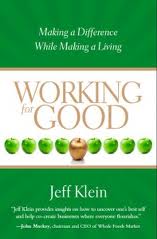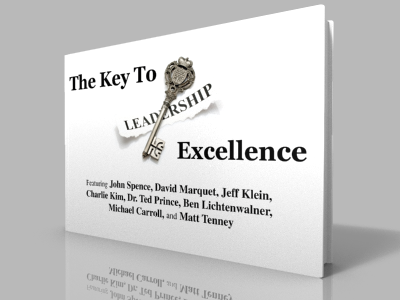Powerful tools for achieving leadership excellence while making the world a better place.
Jeff Klein is an activator, producer, process facilitator, and the author of Working For Good and It’s Just Good Business. He is one of the founders of Conscious Capitalism, Inc.(activator), (producer) of Conscious Capitalism events, including an annual Conscious Capitalism CEO Summit, and as a (process facilitator) he designs and leads workshops, meetings, Conscious Culture development programs and Stakeholder Engagement Marketing™ campaigns.
Below is a recent interview I had the pleasure of facilitating with Jeff, which I’m sure you’ll enjoy!
About thirty years ago, you felt a calling to leverage the power of business for the greater good and in the process to make your work a path to learning, growth, and development. Ever since, you have been helping people see the connection between making a difference in the world, achieving better business outcomes, and enjoying the ride. What are the three biggest competitive advantages you see for a leader who successfully aligns the achievement of positive business outcomes with serving the greater good?
Perhaps the most significant benefit is the personal and collective energy and flow this fosters. When a person (e.g. a business leader) and a group of people (e.g. their team and their entire business stakeholder ecosystem) are focused on a higher purpose and act in alignment with that purpose, there is a tremendous sense of meaning, engagement, and connectedness, which leads to high motivation, an embodied commitment to responsible communications, and exceptional creativity and productivity.
A second, related benefit, is the trust, engagement, loyalty and sustainability in the relationships between the people (individually and as whole stakeholder groups – e.g. customers, employees, vendors, etc.), which lead to great resilience when challenges arise and sustainability over a long time horizon. Business is a social endeavor and relationships are the foundation of a healthy, flourishing social organism/organization.
A third significant competitive advantage is health, well-being, and flourishing – for the leader, her team and her business. At each level, health enhances performance and reduces direct and indirect or opportunity costs.
What would you say are the three most important things a leader can do to become less self-centered, and more focused on how they can serve, sustainably, the people they lead and the community around them?
As with all things, practice is the key to high performance and to cultivating new capacities. As Aristotle said, “We are what we repeatedly do. Excellence, then, is not an act, but a habit.” If you want to be less self-centered and to serve others, then serve others. There’s a great quote on humility that is relevant here, which goes “humility is not thinking less of yourself, but more of others.” So you don’t have to put yourself down, just see and celebrate the talents and humanity in others.
A key to cultivating the capacity to serve is to elicit and really listen to feedback from others. You may have an idea what it means to serve them, but their needs, perceptions and styles may be different from yours. Ask people what they need and how they can best receive it. And you can ask people if they are open to your observations – ask permission to point out areas where you notice they may benefit from your support and guidance. If they give you permission, they will be more open to receiving your support. And ask “how can I support you right now?”
Ironically, the third thing, which might be the first thing, is to take care of yourself. While that might seem self-centered, if you don’t genuinely take care of yourself, which is different from being self-centered, then you won’t have the knowledge, experience or capacity to truly care for others. By taking care of yourself, I mean physically (what you eat, exercise, sleep, recreation, etc.), emotionally, mentally and spiritually, whatever that means to you.
How important is it to measure progress with this work of becoming a conscious leader? Could you share some ideas for successfully measuring progress?
As human beings we are always measuring in one way or another. Receiving and processing feedback from our environment, which includes other people, is essential to our survival, learning, and flourishing. With respect to the previous question about service versus self-centeredness, we can measure our progress informally by observing the quality of our relationships and the attitude and engagement of the people we work with. We can do so more formally be measuring these things with one or more of the wide variety of assessment tools. Before and after (or ongoing) assessments can provide us with direct and indirect measures of “how we’re doing.” The net Promoter System tools for assessing Customer and Employee engagement are very good. Tilt365 has a good tool for assessing our relationships within our teams, and for shining light on our blind spots. And good, open, honest, periodic conversations with our key collaborators can provide great insight into how we are doing and where we may need or want to focus our attention on further development. This is truly an ongoing process. There is no end point, but a continual journey of discovery and development.
In the words of the late George Leonard, “We fail to realize that mastery is not about perfection. It’s about a process, a journey. The master is the one who stays on the path day after day, year after year. The master is the one who is willing to try, and fail, and try again, for as long as he or she lives.”
Just CLICK HERE, and I’ll send you this eBook, featuring chapters from John Spence, Jeff Klein, Charlie Kim, Michael Carroll, Ted Prince, David Marquet, and Ben Lichtenwalner.








